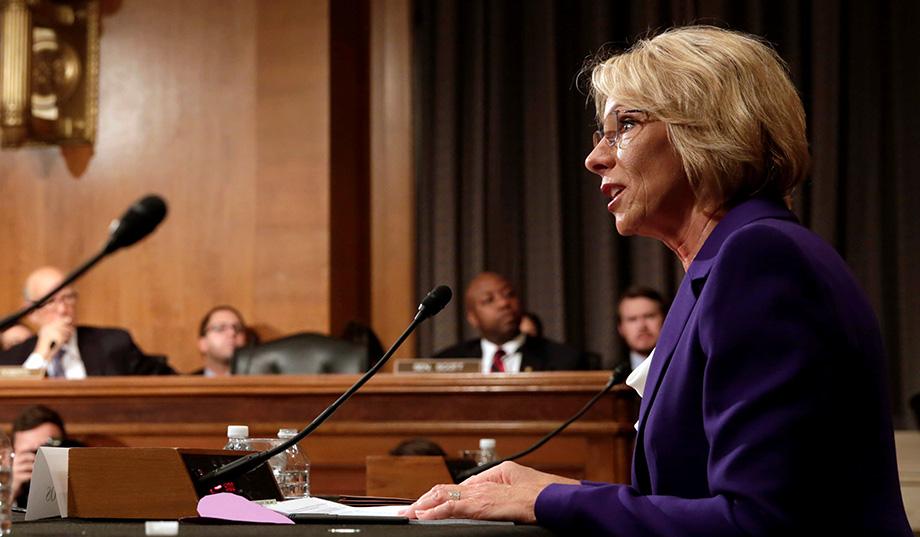An Educator’s Opinion: Why DeVos is NOT qualified to lead Education
I watched the entire confirmation hearing for the U.S. Secretary of Education nominee, Betsy DeVos, yesterday evening. DeVos is a major proponent and financial backer for “school choice” and prominent advocate for federal aid vouchers for education. Streaming live from a news organization website via my cellphone for nearly 4 continuous hours, I listened. So interested in the buzz surrounding the nomination, I even missed viewing my son’s 2 hour basketball practice so I could sit in my car and hear the Q&A session through the Bluetooth speakers.
I never desired for my blog to become political, but as someone seriously passionate about education, as a former educator, as a parent, and as a tax payer, I feel compelled to share my thoughts.
There are quite a few things I strongly agree with Mrs. DeVos about – for instance, like DeVos, I agree every student should be provided a quality education, regardless of socio-economic status. I also agree the idea that “one-size-fits-all” does NOT work in education and the practice should be abolished. I also welcome the idea some charter schools and private institutions may provide curriculums better suited for a particular learning style, and I believe there are business principles that would be highly effective in the academic arena. However, as the hearing progressed, I found myself shaking my head in disbelief at several different instances, and immediately found DeVos’s answers lacking. Additionally, her careful deflection of certain questions and ignorance of educational law were highly troubling.
There were a myriad of disappointing moments in the DeVos hearing last night, but the top four most egregious and offensive to me are listed below:

- Former Sen. Joe Lieberman’s Introduction
Former Sen. Lieberman (D-CT) had the honor of introducing DeVos as the confirmation hearing began. He admitted she didn’t come from the education establishment, but went on to say he believed that to be “one of the most important qualifications” for the job. My eyebrow raised immediately – leading the country’s highest educational department should not require you to not have an education field experience??
Like Mrs. DeVos, at one time, I had strong ideas about how to “fix” the education system. My mother was a classroom teacher with over 20 years experience, I volunteered as a K-12 tutor , had worked as an academic coordinator for an afterschool mentoring program, and fell in love with the No Child Left Behind Act after completing a graduate-level research paper on the policy.
Then I began teaching.
Similar to the childless person who has all the best child-rearing intentions, ideals, and tips until he or she actually becomes a parent and realizes many of the former ideas were futile, until you have actually secured several years (or even just one year) under your belt as a classroom educator, you can’t see there are many complexities and peculiarities in the education field that simply cannot be understood by an outsider. From grasping Maslow’s law, or realizing Piaget might have actually been on to something, to understanding how communities and home life affect the 25+ different young individuals on a daily basis, the education field is truly a mix of art and science, and definitely not something one can just absorb by reading or third-person osmosis. The fact that Mrs. DeVos has spent time volunteering and mentoring is certainly admirable – but mentoring is vastly different from owning the responsibility of learners’ educational success and achievement on a daily basis– the two simply do not compare.
Simply put, teaching and leading in the education field cannot be managed by someone with no direct experience. Just as I would never attempt to guide American military troops with my well-meaning, but uninformed and inexperienced advice, the field of education is best left to be directed by someone who understands the field, understands the obstacles as well as the successes, someone who is experienced.
- Proficiency versus Growth
Sen. Al Franken (D-Minn) asked DeVos a question regarding test scores and whether she believes their use should be focused on measuring proficiency or growth. I was highly disappointed Mrs. DeVos could not seem to articulate the difference between the concepts of student proficiency (a standard of measurement to obtain) and growth (the level of improvement of a learner over time).
How can one set targets and objectives without the understanding of proficiency, and have the ability to describe how proficiency attainment looks at each level? How can one recognize student improvement without realizing that it’s displaying growth?
I cannot fathom a school district hiring an administrator who did not know the difference in these basic concepts, much less the Department of Education hiring a leader who views the two as being interchangeable.
- School Accountability
Sen. Tim Kaine (D-Va) repeatedly grilled Betsy DeVos on her beliefs on equal accountability for public, public charter, or private educational institutions. Mrs. DeVos continuously smiled and repeated “I support accountability”. After asking several times whether she believed in “equal accountability” and “If confirmed, will you insist on that accountability?” (and being answered with “I support accountability”), Sen. Kaine finally stated “I think all schools who receive taxpayer funding should be equally accountable. Do you agree with me?”, to which Betsy DeVos replied, “Well, no…”
No?? She doesn’t believe schools that receive taxpayer funding should be held equally accountable? Although I agree with the availability of charter schools to provide an option for students to attend, and also agree with the federal funding of these organizations, I was particularly dismayed and astounded when Mrs. DeVos said she did not believe the institutions should be held accountable under the same measures.
I find this to be highly troubling, as it opens the possibility for the commercialization of K12 education – any person or corporation would be able to open a school to receive public funds via vouchers, and not be held to the same standards as the public schools are currently being held to.
Why would the expectations and objectives differ? If Mrs. DeVos were interested in the success of every learner (as each Secretary of Education should be) , why would she not find it necessary to hold all schools to the same level of scrutiny, accountability, and expectation of success?
- IDEA Law
Senators Tim Kaine (D-Va) and Maggie Hassan (D-NH) also approached the topic of the Individuals with Disabilities Education Act (IDEA). This law, originally enacted over thirty years ago, ensures educational agencies that receive federal funding will provide services to children with disabilities for free. These services include intervention, special education, and other services deemed appropriate by a learner’s Individualized Education Program/Plan (IEP).
In response to a question asked by Sen. Kaine’s question whether she believes all schools receiving federal funding should meet the requirements of IDEA, Mrs. DeVos replied “I think that’s best left to the States”. Sen. Hassan asked DeVos to clarify how the matter could be left to the states when it was federal law – and asked whether DeVos plans to enforce the IDEA law in all federally funded programs. Unfortunately, Mrs. DeVos refused to answer the question, and instead referred to a single program in Florida. Sen. Hassan noted the non-answer, and stated she was concerned DeVos was unfamiliar with the law.
My immediate question became, how can our nation’s leader on education not be familiar with the current educational laws that govern how federal funding is to be used? IDEA was originally enacted in 1975 and revamped in 1990. Over 6 million students are currently affected by IDEA, and it has a significant presence in today’s schools.
Without knowledge of the federal laws, how can the public expect Mrs. DeVos to enforce them? How can we expect her to protect the educational rights of millions of students who depend on IDEA for access to the tools necessary for their success? If the laws aren’t enforced, what happens to the IDEA student who attends a non-traditional school federally funded via vouchers that refuses to provide accommodations?
I strongly believe in quality, equitable educational experiences for ALL students. I believe those we look upon to lead should be sufficiently knowledgeable of the area they plan to direct. I also happen to believe in accountability and the ability to count on our leaders to uphold the laws that protect our most vulnerable of citizens – our youth. I believe yesterday’s confirmation hearing has shown that Betsy DeVos is not qualified for this post.
These four education-based concerns are the primary reasons why I have reached out to my senators’ offices to request Betsy DeVos is not granted the nomination for U.S. Secretary of Education. I hope that you join me. Please call your senators at 1-855-882-6229 and demand they vote NO for the nomination of Betsy DeVos.





